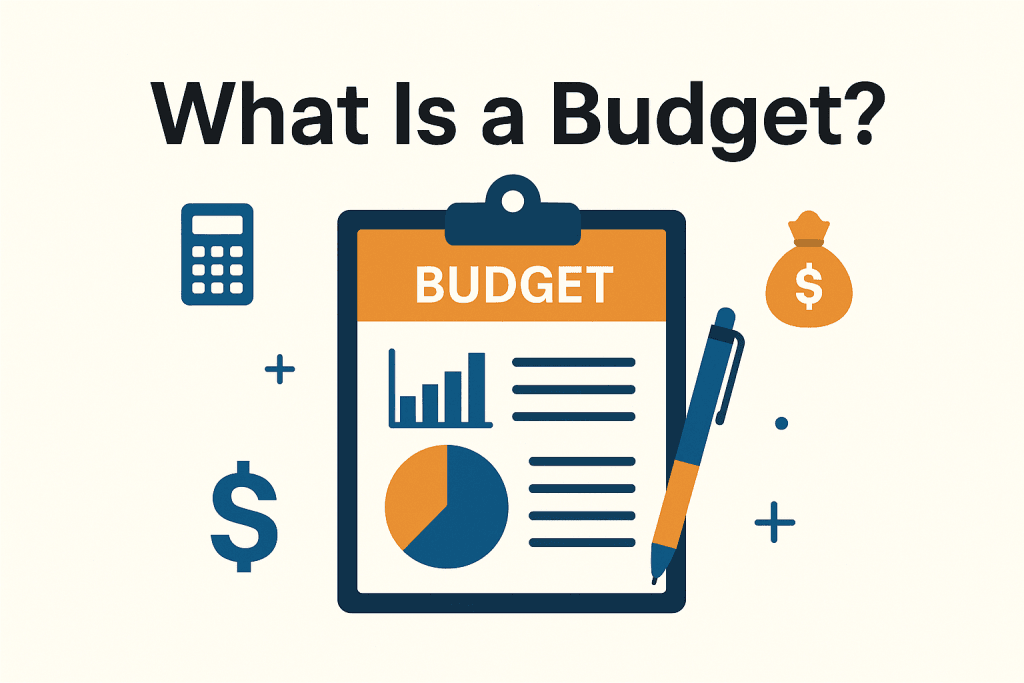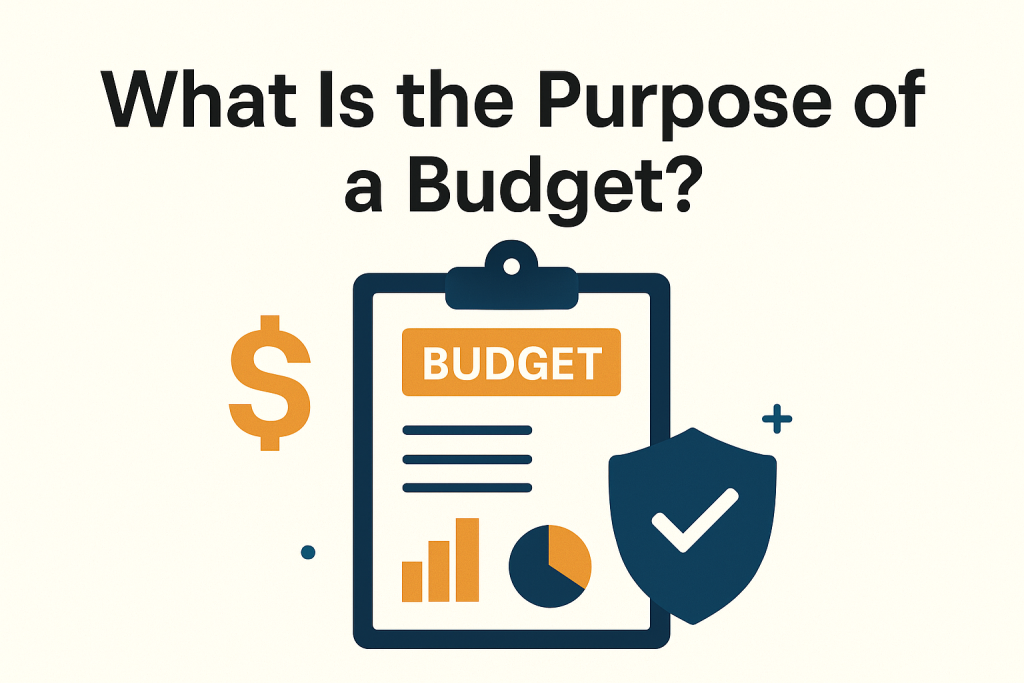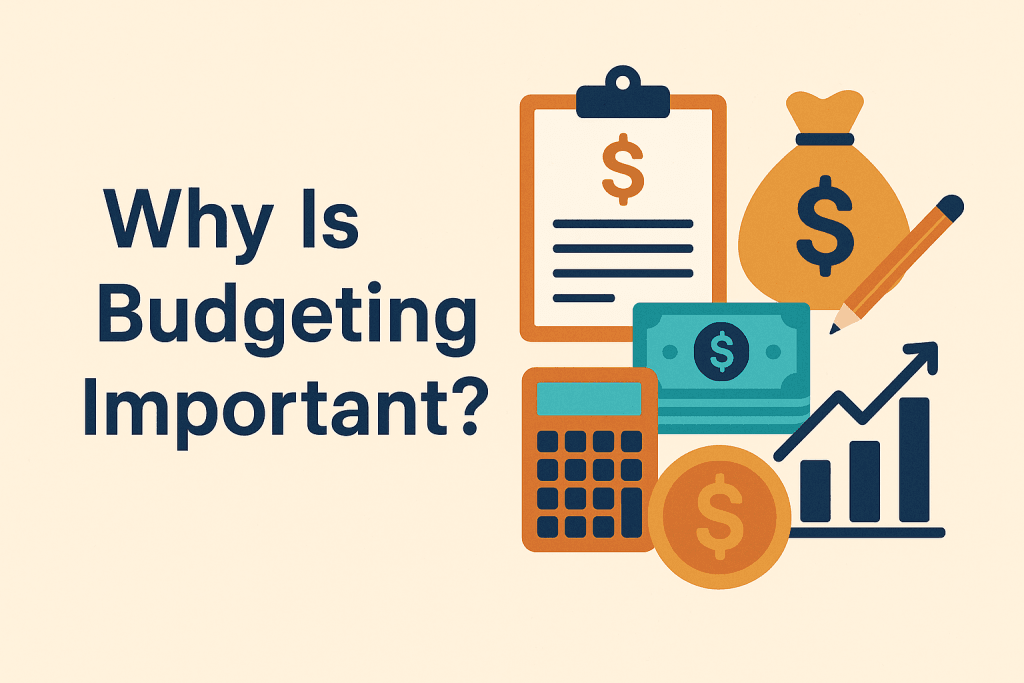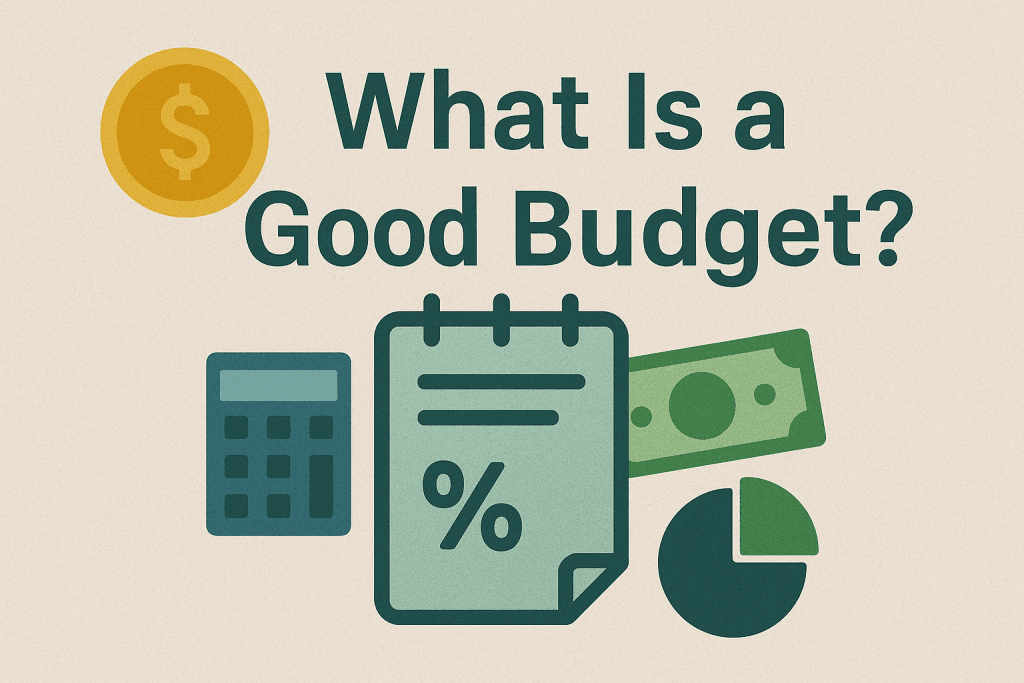In today’s world, where financial uncertainty is increasingly common, the term “budget” plays a central role in how we plan, save, and spend our money. Whether you’re managing a household, running a business, or saving for a vacation, a well-structured budget is your financial roadmap.
But what is a budget exactly? Why do experts always emphasize the importance of budgeting? And what does a “good” budget actually look like?
This comprehensive guide explores these questions in-depth while also shedding light on the purpose of a budget, why budgeting is important, and how to create a realistic, flexible, and effective personal budget that fits your lifestyle and goals.
See more: how to make a budget based on income
Understanding the Basics – What Is a Budget?
A budget is a detailed financial plan that outlines expected income and expenses over a specific period, usually a month. It serves as a roadmap for your money, helping you make informed decisions, avoid debt, and build wealth.

Related Terms and Synonyms:
Financial plan
Spending plan
Expense tracker
Income allocation strategy
A budget can be as simple or as complex as you want. For individuals and families, a basic budget includes income sources, fixed expenses (like rent and utilities), variable expenses (such as groceries or gas), savings goals, and discretionary spending.
What Is the Purpose of a Budget?
Many individuals find themselves trapped in a cycle of living paycheck to paycheck, often wondering where their hard-earned money disappears by the end of each month.
Without a clear understanding of their spending habits, it’s easy to fall into the trap of overspending, neglecting savings, and accumulating debt.

This is where the true purpose of a budget becomes evident—it provides structure, clarity, and direction to every dollar you earn. Rather than allowing money to slip through the cracks unnoticed, a budget assigns intentionality to your income, helping you manage it with purpose and foresight.
One of the most powerful functions of a budget is its ability to track spending. By categorizing and reviewing your expenditures, you begin to recognize patterns, eliminate unnecessary costs, and redirect funds to more meaningful uses. This awareness is the first step toward financial freedom.
A budget also allows you to control your finances, ensuring that you consistently live within your means. Instead of reacting to financial shortfalls, you proactively plan for them, minimizing surprises and reducing stress.
Moreover, budgeting helps you prioritize your financial goals, whether that’s saving for a home, planning a wedding, or building an emergency fund. By clearly outlining what matters most to you, your budget becomes a reflection of your values and long-term aspirations.
Additionally, effective budgeting enables you to build savings systematically. Whether you’re saving for short-term needs or long-term dreams, your budget helps allocate funds toward these goals, transforming savings from a wish into a habit.
Perhaps most importantly, a well-structured budget acts as a safeguard against debt. It encourages you to live below your means, avoid impulsive borrowing, and reduce reliance on credit cards or loans.
In essence, a budget empowers you to live intentionally, ensuring that every financial decision aligns with your values, supports your goals, and strengthens your overall financial well-being. It is not just about restriction—it’s about making conscious choices that bring clarity, security, and peace of mind.
Why Is Budgeting Important?
If you’ve ever asked yourself, “Why is budgeting important?”, consider this: budgeting is the backbone of financial wellness.

Key Reasons Budgeting Matters:
Reduces stress: You won’t fear unexpected bills.
Promotes saving: You start building wealth, not just surviving.
Prevents debt: You avoid overdrafts and credit card traps.
Improves decision-making: You spend consciously.
Encourages responsibility: You become accountable for your money.
With budgeting, you replace anxiety with confidence, and chaos with clarity.
What Is a Good Budget?
A good budget is realistic, adaptable, and goal-driven. It shouldn’t be overly strict or idealistic but should reflect your actual lifestyle.

Characteristics of a Good Budget:
Realistic: Based on true income and spending.
Balanced: Includes needs, wants, and savings.
Flexible: Adjusts as life changes.
Clear: Categorized and easy to follow.
Trackable: Monitored and reviewed regularly.
A good budget feels manageable, not restrictive. It evolves with you.
Types of Budgeting Methods
There are many budgeting strategies, each catering to different lifestyles. Let’s explore the most effective ones.
1. The 50/20/30 Rule:
50% Needs: Rent, food, utilities
20% Savings/Debt: Emergency fund, loan repayments
30% Wants: Entertainment, travel
This method balances life and savings. It’s popular among young professionals.
2. Zero-Based Budgeting:
Assign every dollar a role.
Income minus expenses equals zero.
Great for maximizing efficiency.
3. Envelope System:
Use cash-filled envelopes for each category.
Once empty, spending stops.
Ideal for hands-on budgeters.
4. The 70/20/10 Rule:
70% for essentials and living.
20% for savings/investing.
10% for giving or debt reduction.
5. Pay Yourself First:
Save/invest before you spend.
Encourages saving as a non-negotiable.
Choose a method that aligns with your mindset and money habits.
How to Create a Budget Step-by-Step
Creating a budget doesn’t require a finance degree—just a little focus.
Step 1: Calculate Your Total Income
Add up all monthly income sources:
Salary (after taxes)
Freelance/side hustles
Investments
Government benefits
Step 2: Track and Categorize Expenses
Review the last 2–3 months. Categorize:
Fixed expenses (rent, insurance)
Variable expenses (food, fuel)
Discretionary (shopping, hobbies)
Step 3: Set Financial Goals
Decide what you’re working toward:
Build a $1,000 emergency fund
Save for a vacation
Pay off student loans
Step 4: Assign Income to Categories
Use your preferred method—50/20/30, zero-based, etc.
Step 5: Review & Adjust Monthly
Track performance weekly. Adjust based on real expenses or life changes.
Common Budgeting Mistakes to Avoid
Budgeting isn’t foolproof unless done carefully. Here are mistakes to avoid:
Guessing Expenses: Use real numbers, not hopes.
Ignoring Irregular Costs: Budget for gifts, car repairs, etc.
Not Updating Your Budget: Life changes—so should your plan.
Being Too Strict: Over-restriction leads to burnout.
Forgetting Fun: Include room for enjoyment.
Think of budgeting like fitness. It should be sustainable, not punishing.
Tools and Apps to Help You Budget
Thanks to technology, budgeting is easier than ever.
Best Budgeting Apps:
Mint: Great for beginners. Automatic tracking.
YNAB (You Need a Budget): Powerful for goal-focused budgeting.
EveryDollar: Based on zero-based budgeting.
PocketGuard: Shows what you can safely spend.
Google Sheets/Excel: Custom-built tracking.
Find what works best for your style—manual, automatic, or app-assisted.
Budgeting for Different Life Stages
Your financial needs evolve over time. So should your budget.
Students:
Budget tuition, books, basic living expenses.
Avoid debt wherever possible.
Start building financial habits early.
Young Adults:
Prioritize savings, rent, debt payments.
Set up investment accounts.
Build credit wisely.
Families:
Budget for children, education, family emergencies.
Set joint goals.
Create sinking funds for holidays, repairs, and gifts.
Retirees:
Focus on healthcare, lifestyle maintenance, and security.
Use fixed income wisely.
Budget for legacy planning.
Budgeting Myths Debunked
Let’s clear up some popular misconceptions.
Myth 1: “Budgeting is only for broke people.”
Reality: Wealthy people budget to stay wealthy.
Myth 2: “Budgets are too complicated.”
Reality: A simple list on paper can be enough.
Myth 3: “I don’t make enough to budget.”
Reality: Budgeting is most important when income is tight.
Myth 4: “Budgeting means I can’t have fun.”
Reality: A good budget includes room for enjoyment.
The Psychological Impact of Budgeting
Budgeting isn’t just financial—it’s emotional.
Mental Benefits:
Clarity: Know where your money goes.
Confidence: Stay in control during financial uncertainty.
Reduced Stress: Say goodbye to end-of-month panic.
Empowerment: You make smarter decisions with fewer regrets.
Financial health leads to mental peace.
Long-Term Benefits of Smart Budgeting
Smart budgeting leads to long-term rewards that compound over time.
Lifelong Benefits:
Wealth accumulation: More money saved and invested.
Financial freedom: No dependence on paycheck-to-paycheck living.
Debt freedom: Less interest, more ownership.
Early retirement: Plan and retire years ahead of your peers.
Lifestyle upgrades: Buy guilt-free when it fits in your plan.
Budgeting is the foundation of all financial success.
Budgeting Is the Key to Financial Success
So, what is a budget really?
It’s more than a spreadsheet. It’s a system, a lifestyle, and a mindset. When you understand the purpose of a budget, see why budgeting is important, and build a good budget, you unlock a life of intention and clarity.
Start where you are. Track your income. Understand your habits. Choose a budgeting method that works. And don’t forget—budgeting isn’t about restriction. It’s about direction.
The journey to financial freedom begins with a single habit: creating and sticking to a budget.

